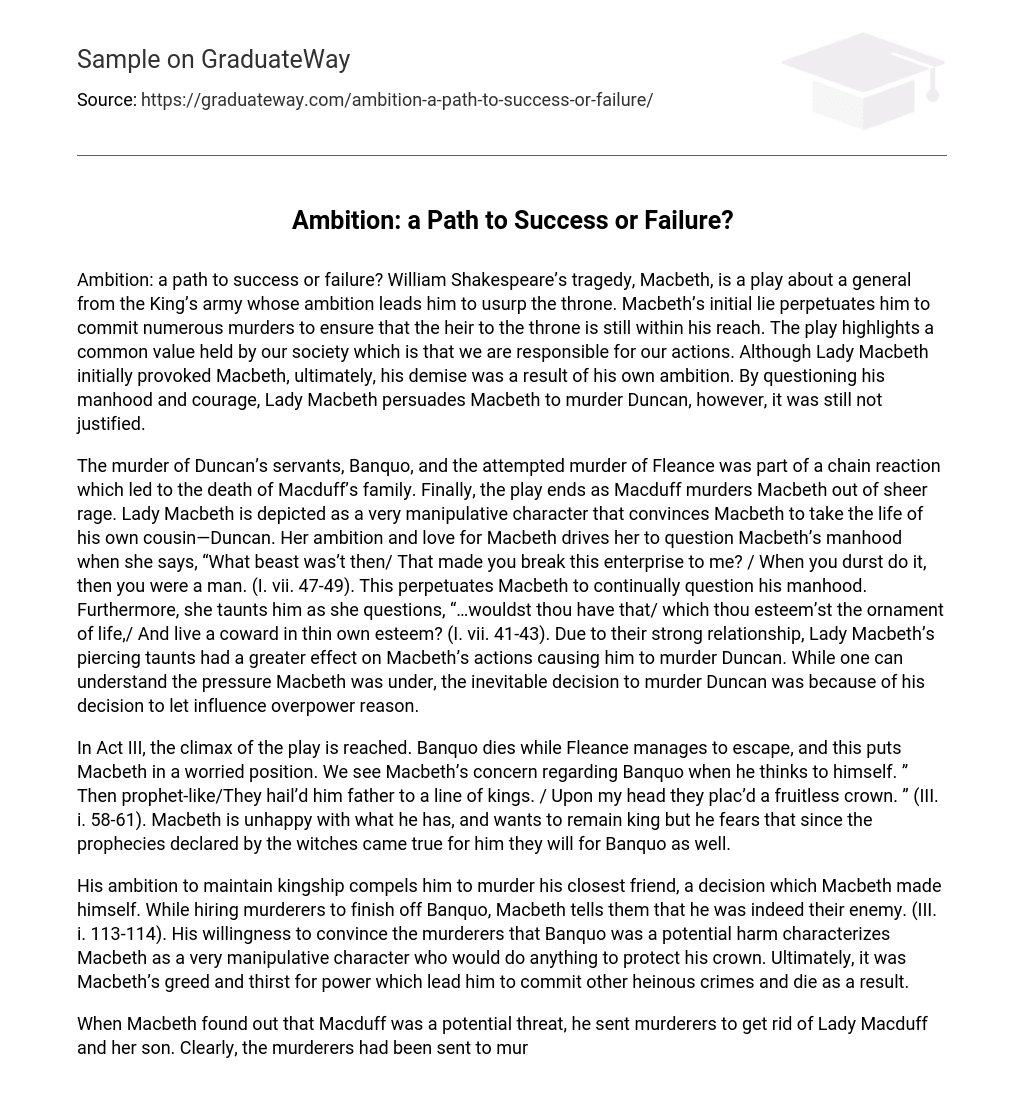Ambition: a path to success or failure? William Shakespeare’s tragedy, Macbeth, is a play about a general from the King’s army whose ambition leads him to usurp the throne. Macbeth’s initial lie perpetuates him to commit numerous murders to ensure that the heir to the throne is still within his reach. The play highlights a common value held by our society which is that we are responsible for our actions. Although Lady Macbeth initially provoked Macbeth, ultimately, his demise was a result of his own ambition. By questioning his manhood and courage, Lady Macbeth persuades Macbeth to murder Duncan, however, it was still not justified.
The murder of Duncan’s servants, Banquo, and the attempted murder of Fleance was part of a chain reaction which led to the death of Macduff’s family. Finally, the play ends as Macduff murders Macbeth out of sheer rage. Lady Macbeth is depicted as a very manipulative character that convinces Macbeth to take the life of his own cousin—Duncan. Her ambition and love for Macbeth drives her to question Macbeth’s manhood when she says, “What beast was’t then/ That made you break this enterprise to me? / When you durst do it, then you were a man. (I. vii. 47-49). This perpetuates Macbeth to continually question his manhood. Furthermore, she taunts him as she questions, “…wouldst thou have that/ which thou esteem’st the ornament of life,/ And live a coward in thin own esteem? (I. vii. 41-43). Due to their strong relationship, Lady Macbeth’s piercing taunts had a greater effect on Macbeth’s actions causing him to murder Duncan. While one can understand the pressure Macbeth was under, the inevitable decision to murder Duncan was because of his decision to let influence overpower reason.
In Act III, the climax of the play is reached. Banquo dies while Fleance manages to escape, and this puts Macbeth in a worried position. We see Macbeth’s concern regarding Banquo when he thinks to himself. ” Then prophet-like/They hail’d him father to a line of kings. / Upon my head they plac’d a fruitless crown. ” (III. i. 58-61). Macbeth is unhappy with what he has, and wants to remain king but he fears that since the prophecies declared by the witches came true for him they will for Banquo as well.
His ambition to maintain kingship compels him to murder his closest friend, a decision which Macbeth made himself. While hiring murderers to finish off Banquo, Macbeth tells them that he was indeed their enemy. (III. i. 113-114). His willingness to convince the murderers that Banquo was a potential harm characterizes Macbeth as a very manipulative character who would do anything to protect his crown. Ultimately, it was Macbeth’s greed and thirst for power which lead him to commit other heinous crimes and die as a result.
When Macbeth found out that Macduff was a potential threat, he sent murderers to get rid of Lady Macduff and her son. Clearly, the murderers had been sent to murder Macduff, her son and the rest of the people living in the castle. Later on, Ross hesitantly reveals to Macduff and Malcolm that “…your wife and babes, / savagely slaughter’d to relate the manner/were on the quarry of these murder’d deer/ To add the death of you. (IV. Iii. 204-207). Upon hearing the description of his family’s murder, Macduff’s emotions were heightened to the extent that revenge became his motive.
His anger towards Macbeth drove him to commit the murder of Macbeth. At the end of the play, the result of Macduff’s fury is seen when he proudly holds Macbeth’s head and exclaims “Hail King! For thou art: behold where stands/ The usurper’s cursed head. ” (V. viii. 54-55). Even though it was Macduff who murdered Macbeth, his final words reveal that the true cause of Macbeth’s death were his selfish desires which caused the demise of Scotland but also brought on his own death. It can be argued that The Witches were solely responsible for Macbeth’s downfall.
The play begins with The Witches planning to meet with Macbeth and when they finally do, they reveal to him, three prophecies stating that he will get the title of Thane of Glamis, Thane of Cawdor and shall be king hereafter. (I. iii. 48-50). Throughout Macbeth, the Witches are known to have supernatural powers, for example when revealing the three apparitions to Macbeth. It is possible to assume that perhaps Macbeth was not in a solid state of mind whilst committing murder after murder. The Witches could have been responsible for somehow controlling his thoughts and actions.
Without specific evidence from the text, it is hard to support this theory, and because there is not enough to suggest a possible force controlling Macbeth, it is unjustified. More evidence suggests that Macbeth was indeed making his own decisions, therefore, it was his own wrong doings that caused his descent into madness. Lady Macbeth, an important character in the play, plays a vital role in initiating Macbeth’s rise and fall. However, Macbeth as a person in control of his own thoughts did not have reasonable judgment and therefore was easily convinced by Lady Macbeth to murder Duncan.
Due to his inability to use logic and reason, he commits a series of cruel murders, to cover up his first mistake. Furthermore, Banquo and Macduff’s family became victims of Macbeth’s tyranny. This eventually leads Macduff to take it upon himself to rid Scotland of Macbeth. Shakespeare’s play demonstrates the power of ambition and how one can lose the importance of logic, reason, and goodwill.
Works Cited Shakespeare, William. Macbeth. Don Mills, Ontario: The Hunter Rose Company, 1965.





